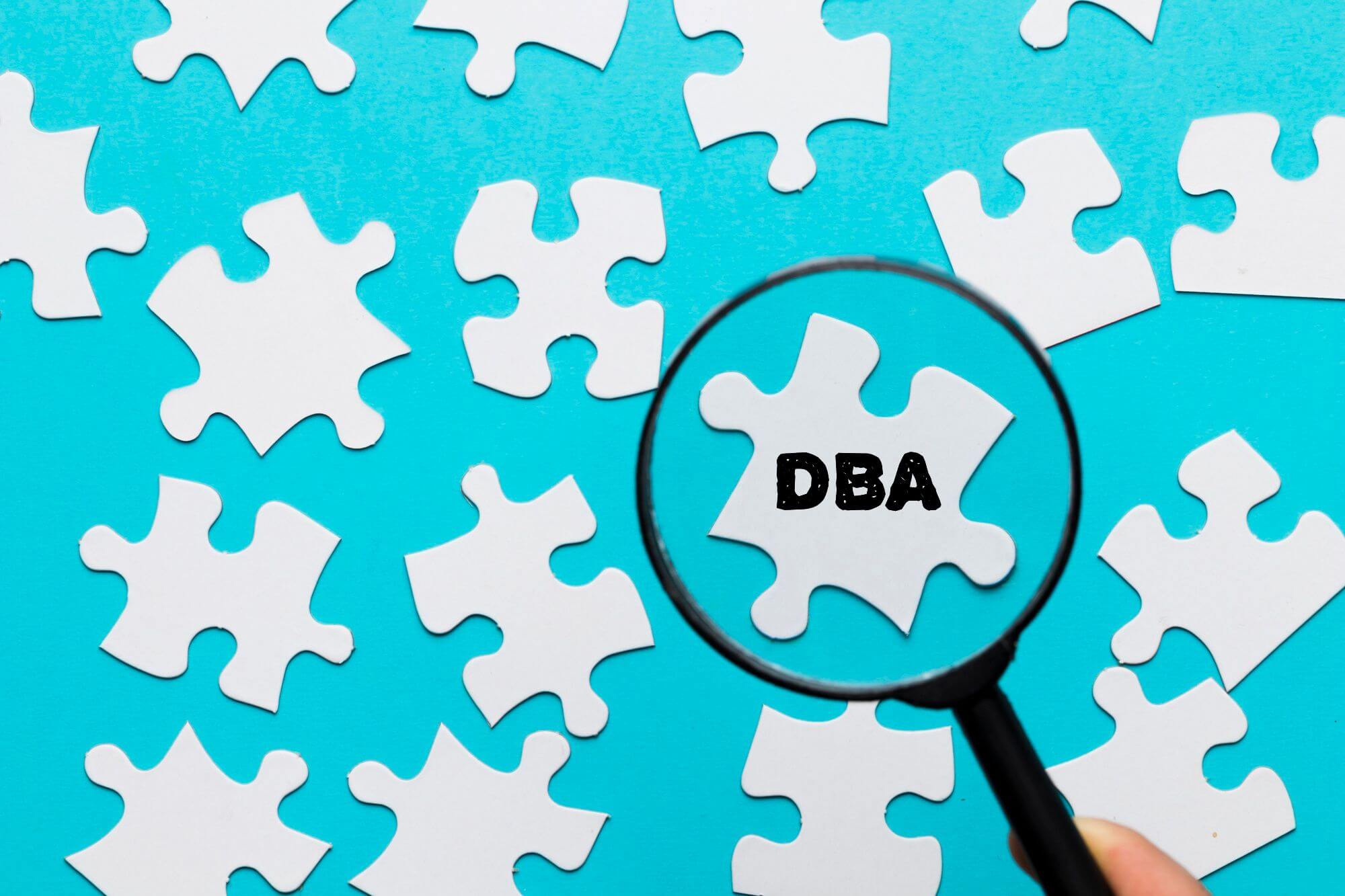In the ever-evolving world of entrepreneurship, operating under a fictitious business name, or “Doing Business As” (DBA), can be a smart strategic move. Whether a solo entrepreneur or managing a small business, a DBA allows you to brand your enterprise distinctively.
This guide will unravel the intricacies of filing a DBA, equipping you with the knowledge and confidence to navigate the process seamlessly. Whether rebranding, expanding, or starting anew, understanding how to file a DBA is fundamental to establishing your unique business identity.
How to Set Up a DBA in the US in 3 Easy Steps
1. Choose Your Location
For most small businesses, you’ll register your DBA in the same state or county where you operate as an LLC, corporation, partnership, or sole proprietor. However, you can also register a DBA in a different location if it makes sense for your business.
2. Check Name Availability
Search online for the state or county where you plan to register your DBA to ensure the name is available. In most states, a DBA name must be unique and cannot closely resemble another DBA, LLC, or corporate name already registered in that state or nationally recognized.
Your state agency responsible for registering business names, such as the Secretary of State, typically offers a searchable database of names in use. The county likely has a similar resource. Enter your desired DBA name to check if a business with that name already exists in the state or county.
3. Register Your DBA With the State
Typically, you register a DBA with the same office where you register an LLC or obtain a Tax Identification Number (TIN). Depending on your location, this could be the county clerk, the state’s Department of Revenue, or the Secretary of State’s office.
You’ll need to create an account if you don’t have one already. If you’ve filed an LLC with the department, you might already have an account. To file the DBA, you’ll likely need to provide:
- Your business’s legal name (or yours if you’re a sole proprietor)
- Your Federal Employer Identification Number (EIN), Social Security number, or state tax ID
- The name you want to register as a DBA
You can file for a DBA through an online application. Once your DBA is accepted, you’ll be notified by mail or email. At the end of the application, you should know the decision timeline, which typically takes a couple of weeks.
Most states and counties charge a small fee to file a DBA, usually around $10 but up to about $100. You’ll also need to renew your DBA registration periodically, typically every one to three years.
>> Try BusinessRocket Today! >>
How to Set Up a DBA in the US – Buyer’s Guide
What Is a DBA?
Your DBA is the name your business is known by both legally and by consumers. It has a few aliases: fictitious business name, assumed name, or trade name.
A DBA is perfect for sole proprietors who prefer not to use their own names as their company name, as well as for entrepreneurs and small business owners who want to choose a business name without becoming a corporation.
Having a DBA means that the person or business entity intends to use that name to identify themselves to the public, as Kimberly Hanlon, attorney at Lucēre Legal LLC, explains.
The legal name remains the person’s name (for an unregistered sole proprietorship) or the business entity (for a corporation or LLC), but the name the public recognizes the business by is the DBA name.
What a DBA Is Not
A DBA isn’t a legal business entity; it’s simply a name your business can use instead of its legal name. DBAs must be associated with a business entity.
Examples of business entities include:
- Sole Proprietorships (not a legal entity)
- General Partnerships
- Limited Liability Companies (LLCs)
- For-profit and Nonprofit Corporations
- Limited Partnerships (LPs)
- Limited Liability Partnerships (LLPs)
When you form an LLC, corporation (S corp or C corp), LP, or LLP, your business gains limited liability protection. This protection means that if your business is sued, your personal assets are safeguarded.
Sole proprietorships and general partnerships operate legally under the owner’s personal name and don’t have limited liability protection. While you can operate under a DBA as a sole proprietor or general partnership, the business still lacks limited liability protection.
After You File Your DBA
Once your DBA is accepted and officially registered, you can use it in your business operations. This allows you to open a bank account and write contracts using the DBA name to represent your business.
You can also use it to sell your business or parts of it, including the brand name DBA, as intellectual property. Not all states restrict the use of duplicate DBAs, and most protections don’t extend across state lines.
For stronger protection against others using your trade name, you can register it as a trademark with the United States Patent and Trademark Office (USPTO). However, this isn’t required to make the DBA official.
>> Conduct a Name Search With BusinessRocket >>
When to Use a DBA
Branding
Whether your business is a sole proprietorship, partnership, LLC, or corporation, filing a DBA (Doing Business As) name can make creating or building a particular brand easier. If your business offers multiple distinct products or services, registering a DBA can help you highlight and market-specific ones uniquely.
For sole proprietorships or partnerships, choosing a DBA name can simplify marketing efforts, making it easier to attract more customers and grow your business.
Privacy
Sole proprietorships and general partnerships must use their surnames as their legal name. If you run a sole proprietorship and prefer to avoid having your name appear in directories, online, or on public records, setting up a DBA is a good practice to protect your privacy.
Setting Up Multiple Businesses Under One LLC
Entrepreneurs looking to create several businesses can do so under a single Limited Liability Company (LLC) by creating DBAs for each business. This allows them to operate multiple ventures while maintaining the protection and simplicity of one LLC.
Banking
Some banks require sole proprietors and general partnerships to have a DBA to open a business account. Having a DBA adds credibility when accepting payments, as customers see the business name they expect.
Domain Name Availability
Your business name might not be available as a domain name. Some business owners choose to file a DBA that matches their domain name, ensuring consistency and brand recognition online.
Credibility
Sole proprietors and general partnerships can often gain more credibility by using a business name that isn’t their personal name. This can help present a more professional image to customers and clients.
>> Conduct a DBA With BusinessRocket >>
How Much Does Registering a DBA Cost?
DBA filing fees vary by state, typically ranging from $5 to $50 but averaging closer to $20. In some states, fees can be as high as $150.
Not registering a DBA can be costly. This is due to consumer protection laws. States must know who to contact when a consumer complains. While business licenses usually handle this, some states don’t require business licenses. However, almost every state requires DBAs to be registered.
There’s no numerical limit to how many DBAs someone can register, but it can become expensive if you register multiple names.
Alabama, Arizona, Nebraska, Oklahoma, and Rhode Island are the only states that require some operating under a DBA to register. It’s best to check with your state about local requirements.
What Are the Advantages of Having a DBA?
A DBA can accomplish several things for a business owner:
- Rebranding a Company: A DBA is an excellent way for your organization to change its direction without forming a new corporation or Limited Liability Company. If a business wishes to rebrand itself, it can simply register a DBA instead.
- Distinguishing Between Multiple Companies: DBAs are handy for entrepreneurs who want to differentiate among their businesses.
- Building a Brand for Sole Proprietors: Registering a DBA allows sole proprietors to build a brand under a chosen name instead of using their personal name. This helps reach target customers and promotes the brand to benefit the business.
- Creating an Illusion of Competition: There are less obvious reasons to register multiple DBAs. For example, in the TV show Parks and Recreation, a character owns all tent rental companies within a certain radius, creating the illusion of competition.
What Are the Disadvantages of Having a DBA?
The cost of filing a DBA is a disadvantage. However, all steps toward growth and structure for your business will incur costs. By that logic, the cost of a DBA is hardly a disadvantage.
A common mistake is conflating DBAs with business structures like LLCs. Only the latter provides liability protection in the event of a lawsuit and influences how your business earnings are taxed.
DBAs also aren’t trademarks in themselves. DBAs are disadvantageous only if you misunderstand their purpose.
DBA Taxes
Business taxes are determined by the business’s structure, with specific filing requirements set forth by the IRS.
Since a DBA isn’t a business entity, you don’t need to file a separate tax return for it. The income or loss from a DBA is included in your total tax liability for the business.
So, if your DBA incurs a loss, that loss will be factored into the overall tax liability for your business.
DBA EINs
An EIN (Employer Identification Number) is like a business’s Social Security Number. The IRS uses EINs to track a business’s tax reporting. Any business with employees must obtain an EIN to comply with government regulations.
Since a DBA isn’t a business entity, it doesn’t have its own EIN. The business structure to which the DBA is attached will have an EIN if it has employees.
How to File a DBA in the US – Frequently Asked Question
>> Conduct a DBA With BusinessRocket >>
Bottom Line – How to File a DBA in the US
A DBA, or fictitious name, is a trade name you can use to conduct business without forming an entirely new business entity. Registering is easy and relatively low-cost, and you can complete the registration online in most states.
 Sections of this topic
Sections of this topic
















